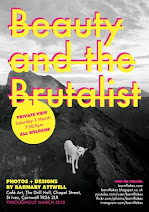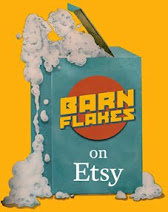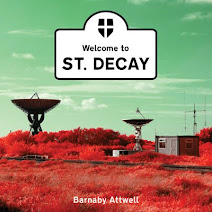At 11:30pm John and I are standing in the middle of Leicester Square with nothing left to do. A light drizzle of rain is in the air, and what with being short of money and the pubs having all closed, we go our separate ways. As I’m walking towards Piccadilly Circus I see Grace and her friends. I call out, ‘Grace!’, and she stops and looks at me but doesn’t recognise me. I’ve just recently had a skinhead. Then she recognises me. She’s wearing a pin-striped suit and a red bandanna in her hair. She says she’s going for the gypsy look, and I say 'What – with a pinstriped suit?', and she almost smiles.
I’d first met Grace two weeks ago with Louise, who John and I had known in Sydney. John had met Louise in the Farrah trouser pressing factory when they both temped there, and then introduced her to me, and we’d gotten on fairly well. There was nothing sexual, and she gave me lots of muffins, and even bought me Bourbons and Cokes, one night along Oxford Street in Sydney.
Last time Grace and I hadn’t got on so well. I had made a derogatory comment about Tottenham, where Grace now lives, and I think she taken an instant dislike to me. But she likes my new haircut. Last time she met me, she tells me, with my long hair, I looked like a middle class wanker. I like Grace’s bluntness. She’s glad we met again. They'd been in Tiger Tiger and had a lousy time. In fact, they were hoping John would phone Grace’s mobile. But John had already phoned Grace three times that day, and wasn’t going to phone a forth. There’s only so many times a man should phone up a woman, and John drew the line at three in one day.
Grace is with her friends Richard, a photographer; his girlfriend with bleached blonde hair, whose birthday it is; Allyce, a lovely Australian girl who’d I’d met with Grace a few weeks back; and another girl. Grace was calling the whole thing a ‘farce.’ We have all been standing around in Leicester Square for about fifteen minutes now. Then Richard comes over and says everyone’s going to Wimbledon, to some nightclub. That just about does it for Kelly. She’s now mighty pissed off.
A skinhead with a tear tattoo below his eye comes up to me, Grace and Allyce with an A4 pink notebook in his hand. He stands there a while. Then he hands me his notebook, and tells me to read something from it. I find a page and start reading what seems like a poem, but is in fact lyrics for a song. Death and despair kind of stuff. He’s getting a band together, which so far consists of ‘Weller [as in Paul], and Noel and Liam [as in Oasis]’. He likes the line-up so far, but needs a backing singer and asks Grace if she’s interested. She says she is, but then she starts going on about some coat she wants to buy. The skinhead looks intense and crazy and tells us if we live in Manchester, Coventry or London, we’ve sold out, and if we wear suits, we’ve sold out. I notice his shoes; red, white and blue, and then he leaves us, telling us he’s always been a mod.
We decide to go to Soho for coffee but get lost on the way. Grace and I have only lived in London for twenty-seven years after all, so it’s down to Allyce to show us the way. She’s been here two weeks.
Grace had played the guitar and sung at the barbecue John had been at last week. John had liked Grace’s voice. It had moved him. I told Grace this and she lit up. ‘Tell me more’, she oozed. I told her as much as I could and she said she knew how to move people. ‘I like moving people’, she said, somewhat devilishly.
It’s raining lightly as we sit down under the canopy of a coffee shop and Grace orders us cappuccinos. A black raster busker starts talking to us, he sits down next to me and his guitar is out of tune so Grace tries to tune it but breaks it instead. The guy bitches about London people, the price of the yellow rickshaws, and stuff like that. Then he asks us for money, which we don’t give him, and he leaves, after winking at me.
Our cappuccinos arrive in paper cups. Next to us a group of European-looking young people are drinking their coffees in nice pastel-coloured mugs. Grace wonders why they get china and we get paper. I suggest it might be because they’re Europeans. The girl next to me says she’s not European. I ask her where she’s from and she says Milton Keynes. I say to Grace it may as well be Europe and she smirks, without humour. Allyce says nothing, and although beautiful, she is dull. Grace’s still complaining about the fiasco, the farce of the evening and says she can’t believe she’s in this cafe at midnight. The only time she’s usually here is at 6am. A farce.
Allyce goes home and Grace invites me back to her place in Tottenham. I say sure, having nothing else to do. It takes half an hour for a night bus to arrive. When it does it is packed and hot. It rushes past all the bus stops which are also packed with people but there’s no more room on the bus.
We get off at Finsbury Park, along Turnpike Lane, and a taxi to Grace’s.
Tottenham scares me. There’s police cars everywhere and a row of vans outside a council estate where people stand watching. The estate is cordoned off with yellow tape and I’m tense.
But Grace’s house is nice and the rent is cheap and that’s the only reason she stays in Tottenham. Her big black dog jumps up and greets us as we enter. I don’t like dogs and both Grace and the dog can tell. When I wake up in the morning the house is empty. I help myself to tea and leave. There’s a few bagel shops in the area and I get a cream cheese and salmon one.
(London, 1999)


















